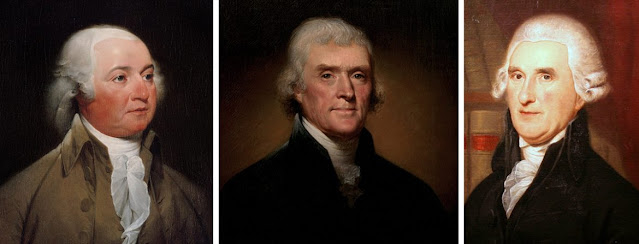WAS THE DECLARATION OF INDEPENDENCE SIGNED ON JULY 4? HOW MEMORY PLAYS TRICKS WITH HISTORY
By Ray Raphael - Posted at Journal of the American Revolution:
Early in 1814, thirteen years into his retirement, John Adams received a bizarre letter from Thomas McKean, a former colleague in the First and Second Continental Congresses. “I will give you an historical fact respecting the declaration of Independence, which may amuse, if not surprize,” McKean wrote. “In the printed public journal of Congress for 1776, vol. 2 it appears, that the Declaration of Independence was declared on the 4th of July 1776 by the Gentleman, whose names are there inserted, whereas no person signed it on that day.” (Emphasis added.) He then listed seven men whose names were affixed to the document but were not even present. McKean, on the other hand, had been “present in Congress on the 4th of July, & voted for Independence.” If others had signed it on that day, he certainly would have as well—and yet, mysteriously, his name had not been included on the list of signers in the July 4, 1776, entry of the Journals of Congress that was published in 1778.[1]Really? This quintessential moment in our nation’s history—signing the Declaration of Independence—didn’t happen on July 4, 1776? That was not how John Adams remembered it. Rather than refute McKean directly (these two aging patriots had formerly quarreled but were then on good terms), Adams passed the letter on to Mercy Otis Warren, who had authored a history of the American Revolution. “I send you a curiosity,” he opened—and he then flatly rejected McKean’s claim. The Declaration had been “prepared and signed on the 4th. What are we to think of history? when in less than 40 years, such diversities appear in the memories of living persons, who were witnesses?”[2]
Thomas Jefferson, author of the Declaration’s first draft, also recalled a signing on July 4. “The declaration of Independence was debated during the 2d, 3d, & 4th days of July & on the last of these was passed & signed,” he told an inquisitive French author a decade after the fact.[3] Benjamin Franklin agreed. On July 4, 1786, he wrote: “There is much Rejoicing in Town today, it being the Anniversary of the Declaration of Independence, which we sign’d that day Ten Years and thereby hazarded Lives and Fortunes.”[4]
So was there a July 4th signing or not? On one side, we have three luminaries who served on the five-man committee charged with drafting the Declaration of Independence, attended Congress on July 4, and cared deeply about its proceedings. On the other side, we have the lesser known McKean, who signed the Declaration at some later date. Check out his signature, which appears with those of Delaware’s other two delegates on the bottom of the fourth column of the National Archive’s official document: Tho M:Kean.



